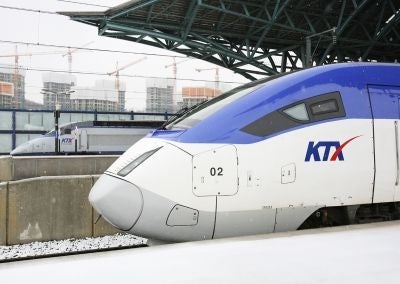China set to slow its trains as South Korea speeds up rail rollout

China has confirmed it is to slow down its high-speed rail system, just as South Korea unveiled its ambitious high-speed railway plan - perhaps giving some of its neighbors a chance to catch up.
Recent reports in US newspaper the Wall Street Journal suggest that China is to begin slowing down its growing fleet of high-speed trains in a bid to cut costs and make journeys more affordable for passengers.
According to the paper's source, speeds of over 330 km/h cost considerably more in energy and increased track inspections, making China's current fleet of 350 km/h trains significantly more expensive than similar systems in countries such as France, Germany and Japan which operate at around 300 km/h.
China has invested large sums of money in connecting its vast cities using high-speed rail, which is touted as cheaper, more convenient for many passengers and more environmentally friendly.
Althgouh it's yet to be seen how much effect the decision will have in terms of schedules and pricing for China's huge market, it will give others in the region a chance to catch up.
Once dominated by Japan, high speed rail is now an ambition of many powers in Asia and although China has been leading in recent years it could soon find itself in competition with countries such as South Korea.
The Korean plan, reported in Railway Gazette, will see a set of major upgrades radically reduce the time it takes to travel inside South Korea, which currently uses only a couple of high-speed tracks.
Planned to be completed by 2020, it will mean that the country's major cities - such as Seoul, Busan and Daegu, will be easily accessible by rail in under 90 minutes, putting further pressure on the country's airlines.
The report quotes Korea's Ministry of Land, Transport and Maritime Affairs as saying that air travel between Seoul and Busan fell by more than 30 percent in the first four months following the opening of a high-speed rail link between those cities.
Such a project would dramatically increase the number of high-speed lines (capable of over 230km/h) within Korea, from 369 km today to 2,362 km by 2020, with the total length of track in the country increasing by over 1,000 km too.
It would also mean considerable green advantages - government officials predict some 7.7 million tonnes in carbon savings annually.
Read the full story: http://www.railwaygazette.com/nc/news/single-view/view/national-plan-to-put-cities-90-min-apart.html
Join our commenting forum
Join thought-provoking conversations, follow other Independent readers and see their replies
Comments
Bookmark popover
Removed from bookmarks